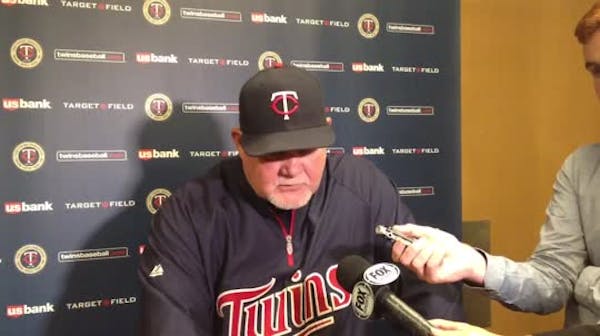Some baseball fans in these parts will scoff and complain when Bud Selig is brought up in a conversation. Many haven't forgotten the contraction threats of 2001 and remember Selig's involvement in a tension-filled period in Twins history.
"I'd like to think that a lot of that has already worn off but, yes, that is going to be part of the history," Twins President Dave St. Peter said.
The Twins, of course, ended up staying. And the league has moved onward and upward. Selig on Thursday announced he will retire following the 2014 season, ending what will be considered one of the greatest runs a commissioner of any major professional sport has had.
Selig took over on an interim basis in 1992, when league revenues were $1.2 billion. MLB is now a $8 billion industry, the result of widespread growth.
Since 1992, 22 stadiums have been built, the MLB Network has launched, the RBI program has expanded and the World Baseball Classic has been established. A drug policy that was embarrassingly weak about 10 years ago has been significantly strengthened.
Perhaps the two greatest accomplishments of Selig's administration have been revenue sharing and labor peace.
"I think history will show that Commissioner Selig was probably as progressive and as innovative as any leader has been in any major professional sport," St. Peter said. "I don't think he's gotten any real credit for what he has accomplished and really transformed the sport. It starts with things like revenue sharing. That led to widespread competitive balance in the game, facility development. Things such as the wild card and interleague play, instant replay. I'm not sure if there has been an individual that has been at the helm for more change than Commissioner Selig has been.
"He will leave the game in a much, much better spot than when he arrived."
Selig has praised Target Field for being one of the best stadiums in baseball. "He's been involved with a lot of different things," Twins manager Ron Gardenhire said. "Here with the Twins, letting us keep our baseball team. It starts with that."
More from St. Peter
Season-ticket sales were around 25,000 in each of the first two years at Target Field before slipping to 23,000 in 2012 and 19,000 this season.
The first payment for 2013 season tickets is due sometime next week, and the Twins will start to get an idea of what 2014 will look like.
"We're still very bullish that our season-ticket base will be one of the bigger ones in the game," St. Peter said. "I'm not predicting that it is going to go up. I'm not predicting that it is going to go down. It is too early to tell."
The Twins continue to announce crowds in excess of 25,000 a night despite a third straight 90-loss season. Teams like the A's and Indians have drawn much less than that despite being in the postseason race. St. Peter said there was a walk-up sale of 1,500 for Wednesday's game.
"As much maligned as our attendance has been, there are 15, maybe 18 teams that would trade for it in a minute," St. Peter said. "The ballpark is great. The experience is great. This is a good baseball town. People are upset with our on-field product and they should be, but I don't think our fans get enough credit for their support for this team, not just this year but the last two years."
Etc.
Former Twins coach Jerry White, who was let go at the end of last season, has hooked up with Cleveland as a coach during instructional league.
Anze Kopitar scores in overtime, Kings beat Oilers 5-4 in Game 2 to tie series
Thunder's Holmgren bests Pelicans' Valanciunas in center matchup to help OKC take 2-0 lead
AP PHOTOS: Russian kids ride sticks with a horse's head in hobby horsing competition
Defending champion Golden Knights beat Stars 3-1 to take 2-0 series lead home to Vegas

